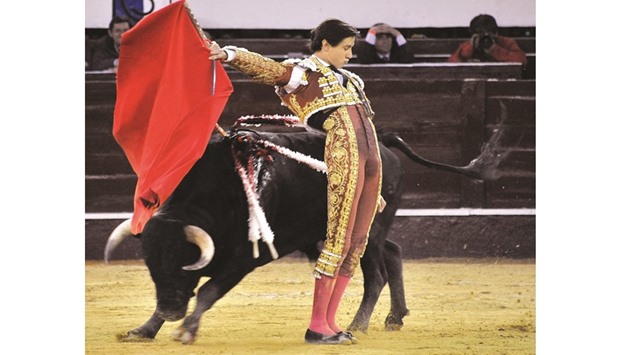Officers used pepper spray and teargas against the demonstrators on Sunday as they shouted “murderers” and “torturers” at bullfighting enthusiasts on their way to Bogota’s iconic redbrick bull ring.
The constitutional court ruled in 2015 that bullfighting was part of Colombia’s cultural heritage and could not be banned. But today, that same court will debate an opinion by one of its magistrates which reportedly argues that the practice violates Colombian laws against mistreatment of animals.
The court is also studying a separate case that asks the court should penalise any actions related to abuse of animals not only in bullfighting but in cock fights and rodeo-type games where animals can be mistreated.
A 2016 law already declared animals “sentient beings” that should receive “special protection against suffering and pain, especially that caused directly or indirectly by humans”.
Bullfighting was banned in Bogota in 2012, but the current mayor, Enrique Penalosa has said that he is bound to uphold the court’s ruling by renting the bull ring to the bullfighters association.
Penalosa – who opposes bullfighting – supports proposed legislation that would seek to “mitigate pain in bullfighting” and would give municipal officials the power to ban them in their localities.
Previous attempts to pass legislation in congress banning the practice outright have run aground in committee hearings.
Foreseeing large protests, 1,200 police were on hand on Sunday for the bullfight.
Hundreds of protesters, many dressed in black as a symbol of mourning, stood at every entrance to the ring. One of then was Maytik Avirama, 25, who said she had participated in anti-bullfighting protests since she was 14 and was frustrated at the return of the spectacle.
“When it was banned we felt a sense of triumph over the elites, not just for animal rights activists but for a whole society that doesn’t want more violence,” said Avirama, an ecologist. “The return of the bullfights is a huge backward step.”
She lamented that the protests themselves turned violent, with demonstrators throwing bottles, stones and brick and police firing teargas.
“Cultural heritage and entertainment are no justification for any activity that causes anguish, suffering and the cruel death of these animals,” said Ricardo Mora, of the group World Animal Protection, in a statement.
The group called on Bogotá residents to not attend the bullfights to show respect for the bulls.
Bullfighting is permitted in just eight countries around the world but has been restricted in some regions so that the spectacle does not end in the bull’s death.
In Ecuador, voters in many cities, including the capital Quito, prohibited bullfighting in a 2011 referendum. Several states in Mexico have also banned the blood sport.
In Spain, where the tradition began, the constitutional court reversed in October 2016 an earlier ban on bullfighting in Catalonia passed by the regional parliament.

